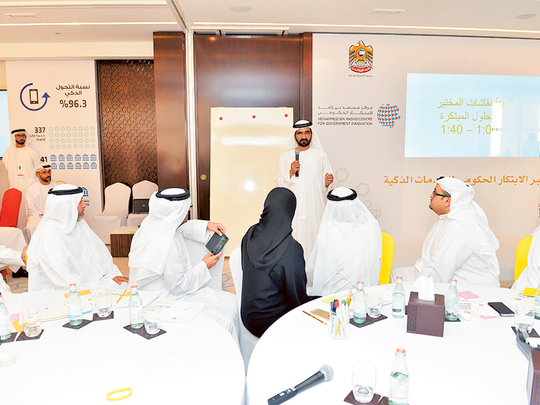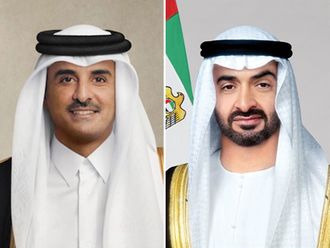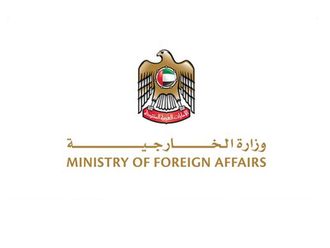
Dubai: His Highness Shaikh Mohammad Bin Rashid Al Maktoum, Vice-President and Prime Minister of the UAE and Ruler of Dubai, yesterday (Tuesday) attended a brainstorming session on the future of smart governments.
Mohammad Abdullah Al Gergawi, Minister of Cabinet Affairs and Chairman of the Higher Committee for Smart Government, was present.
A total of 100 smart government directors and officials took part in the creative lab session hosted by the Mohammad Bin Rashid Centre for Government Innovation to discuss key ideas for developing smart government services and infrastructure, as well as boosting the usage rates and qualities of these services.
“We are aiming, during the coming period, to link federal and local smart government services and offer a unified portal that is available for customers regardless of where they are and which service they require because customers perceive us as one nation and one integrated business environment,” said Shaikh Mohammad.
Shaikh Mohammad said that there is a need to review some legislations and government procedures in order to facilitate smart government work and enhance the efficiency of services. Shaikh Mohammad said that he has a few notes regarding smart services, and added that the coming period requires a comprehensive review and constant assessment on the quality of rendered services.
The Vice-President said that a smart employee is the basis for offering smart services, and pointed out that customers require many service channels that suit their circumstances. He said that government work teams in ministries and authorities worked together successfully for the past two years, and that these teams need to boost levels of coordination between them and unify their efforts with local governments and the private sector.
The participants proposed setting up a customer lab to raise awareness about services and gauge usage rates, as well as to survey their opinion on quality and standards of services required by customers from different cultures.
The lab will also come up with solutions for challenges facing customers and encourage them to use these services by making them simpler and easier to access. The participants discussed the importance of developing proactive smart services by conducting brainstorming sessions with customers to inquire about their needs and expectations, which will contribute to boosting usage rates and achieving a customer satisfaction rate of 80 per cent by 2018.
The participants proposed setting up a ‘government customer fund’ that will contain files with information on every customer. These files can be requested by government bodies thereby facilitating the process for rendering smart services. They also suggested setting up a secure and accessible unified portal that offers customers various payment options to settle all forms of government service fees.
The participants also emphasised the importance of introducing a system for rating smart services based on their efficiency and accessibility.










